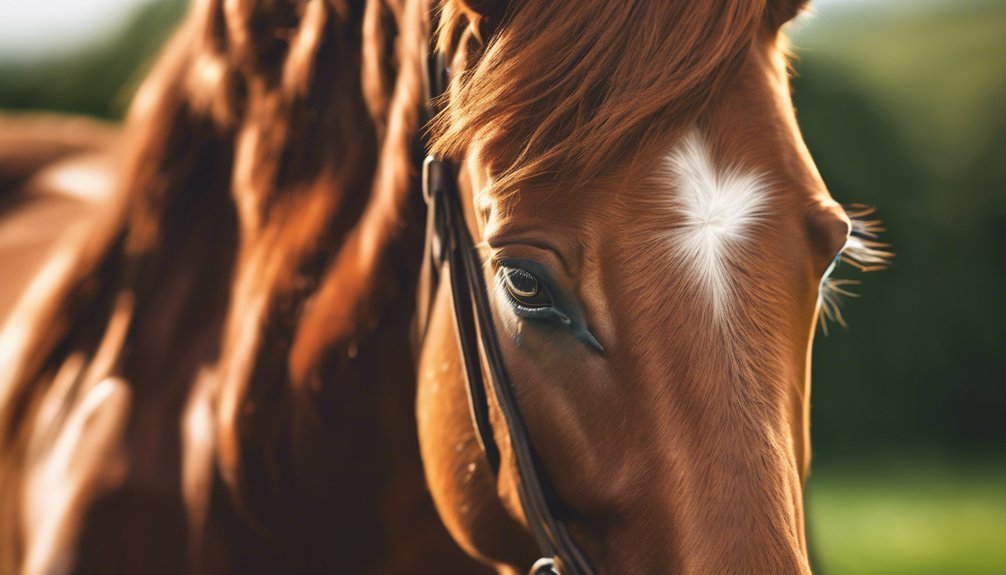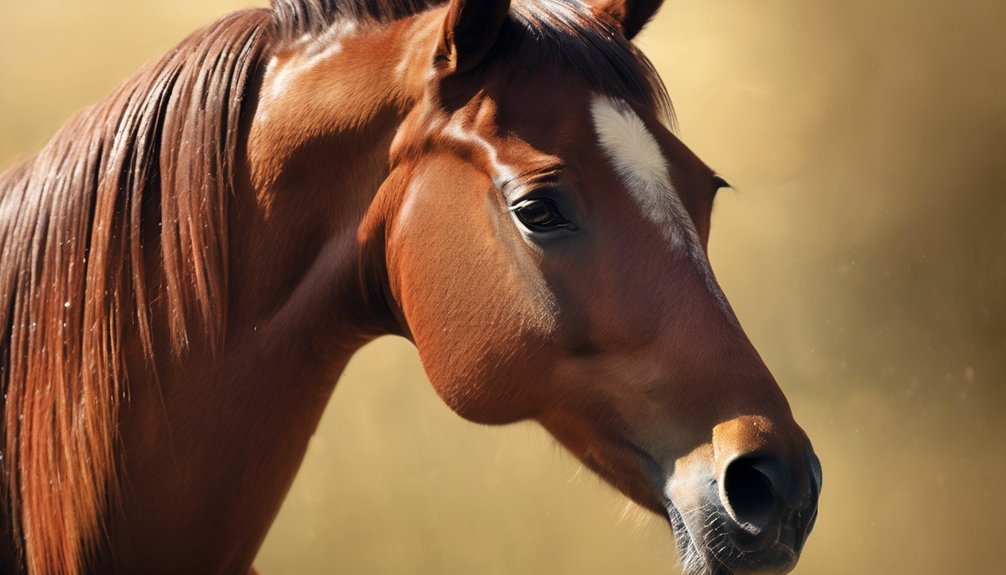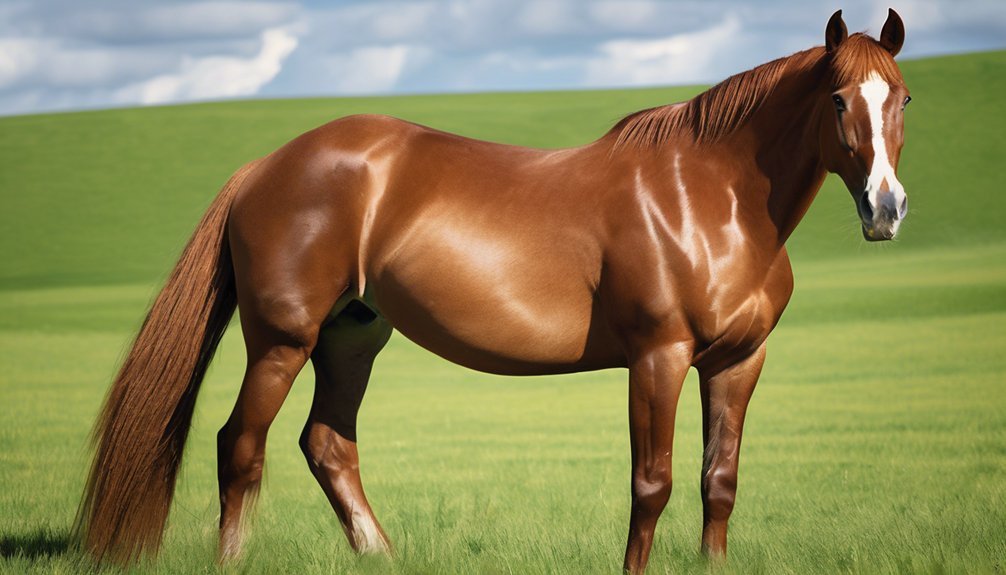
Did you know that up to 80% of a horse's coat quality can be attributed to their diet, particularly protein intake? Understanding how protein influences your horse's coat health is essential for ensuring a shiny and vibrant appearance. With the right balance of amino acids, you can enhance not just the coat's texture but also its resilience. So, what specific nutrients should you focus on to achieve optimal results?
Key Takeaways
- Adequate protein is essential for maintaining a shiny, vibrant coat and overall health in horses.
- High-quality protein sources support keratin production, crucial for strong hair and coat integrity.
- Key amino acids, such as lysine and methionine, play vital roles in skin elasticity and keratin formation.
- Protein deficiency can lead to a dull coat, slower hair growth, and increased shedding in horses.
- A balanced diet featuring protein-rich foods like alfalfa hay and soybean meal promotes optimal coat health and vitality.
Understanding Protein and Its Importance for Horses

Protein plays a crucial role in maintaining the overall health of horses, especially their coat condition.
It's essential for protein synthesis, which helps repair tissues and produce vital substances like enzymes and hormones. When you ensure your horse gets adequate protein from dietary sources, you're fueling their body's functions.
High-quality hay, grains, and legumes are excellent sources that can support their protein needs. As you evaluate their diet, consider the protein content and balance it with energy and fiber to promote optimal health.
A well-rounded diet not only supports their physical condition but also enhances their overall vitality.
How Protein Affects Coat Quality
When horses receive adequate protein in their diet, you'll likely notice a significant improvement in their coat quality.
Protein is essential for maintaining the structural integrity of hair follicles, which directly influences coat shine. High-quality protein sources, such as alfalfa, soybean meal, and specific grains, provide the necessary building blocks for keratin production. This keratin forms the basis of a healthy coat, ensuring it remains strong and vibrant.
Additionally, sufficient protein helps regulate the natural oil production in a horse's skin, contributing to that glossy appearance you admire.
The Role of Amino Acids in Coat Health

Amino acids play a vital role in maintaining and enhancing coat health in horses.
These building blocks of proteins are essential for proper protein metabolism, ensuring your horse's coat remains vibrant and healthy.
Key amino acid types contribute significantly to coat quality:
- Lysine: Crucial for collagen production, supporting skin elasticity.
- Methionine: A sulfur-containing amino acid that aids in keratin formation, strengthening hair.
- Threonine: Important for maintaining healthy skin and moisture levels.
Signs of Protein Deficiency in Horses
A lack of adequate protein can manifest in several noticeable signs in horses, impacting their overall health and appearance.
You might notice a dull, lackluster coat that lacks shine or vibrancy. Horses may also experience slower growth or thinning of their mane and tail, with increased shedding being another common symptom.
Additionally, you could observe muscle wasting or weakness, which can significantly affect their performance. Changes in appetite or behavior may occur as well, indicating potential deficiency symptoms.
To address these issues, consider evaluating your horse's diet and incorporating high-quality protein sources. By ensuring your horse receives sufficient protein, you'll promote a healthier coat and overall well-being, enhancing both their appearance and vitality.
Sources of High-Quality Protein for Horses

To ensure your horse receives the necessary protein for optimal health, it's essential to choose high-quality sources. Incorporating the right protein sources not only supports overall well-being but also enhances coat health.
Consider these options:
- Soybean meal: A complete protein source rich in essential amino acids.
- Alfalfa hay: Packed with protein and vital nutrients, it's a great addition to your horse's diet.
- Fish meal: High in omega-3 fatty acids, it supports skin health and coat shine.
You might also explore beet pulp and whey protein for additional benefits.
Oats nutrition provides carbohydrates but should be balanced with protein sources.
Balancing Protein in Your Horse's Diet
Choosing high-quality protein sources is just the first step in ensuring your horse's overall health and coat vitality. To achieve optimal results, you need to focus on balancing protein in your horse's diet.
Excess protein can lead to health issues, while insufficient amounts can compromise coat quality and overall well-being. Assess your horse's specific needs based on age, activity level, and breed.
Incorporate a variety of protein sources, such as alfalfa, soybean meal, or high-quality commercial feeds, to ensure complete amino acid profiles. Regularly evaluate your horse's body condition and coat appearance, adjusting dietary balance as needed.
A well-balanced diet is essential for not just coat health, but also for your horse's energy and performance.
Additional Nutrients That Support Coat Health

While protein plays a crucial role in maintaining your horse's coat health, several additional nutrients are equally important. Focusing on these can enhance the overall appearance and vibrancy of your horse's coat.
- Vitamins A and E: These vitamins provide significant benefits by promoting skin health and improving coat shine.
- Zinc: This mineral contributes to the overall integrity of hair follicles and supports the immune system, reducing skin issues.
- Omega-3 Fatty Acids: These essential fats help reduce inflammation and improve hydration, resulting in a softer, healthier coat.
Incorporating these nutrients into your horse's diet can foster a beautiful, lustrous coat.
Make sure to consult with your veterinarian for the best sources and amounts tailored to your horse's specific needs.
Frequently Asked Questions
Can Too Much Protein Negatively Affect a Horse's Coat?
Yes, too much protein can lead to protein toxicity, which may negatively impact your horse's coat texture. An imbalanced diet could result in dullness or brittleness, so monitor protein levels carefully for optimal coat health.
How Does Protein Intake Vary by Horse Age or Activity Level?
Protein intake varies significantly; young horses need more for growth, while active horses require higher amounts to support muscle development and energy. Adjusting their diet ensures they meet these needs for optimal health and performance.
Are There Specific Breeds More Prone to Protein Deficiency?
Certain breeds, like Thoroughbreds and Arabians, may be more susceptible to protein deficiency due to their unique breed characteristics. Ensuring diverse protein sources in their diet can help prevent deficiencies and support overall health.
How Long Does It Take to See Coat Improvements From Protein Changes?
You'll typically notice visible coat changes within four to six weeks after adjusting protein intake. Since protein digestion time varies, patience is key, but consistency will yield noticeable improvements in your horse's coat health.
Can Protein Supplements Replace Quality Forage in a Horse's Diet?
Imagine a garden thriving on sunlight and soil; it can't solely rely on artificial lights. Similarly, while some supplement types can enhance nutrition, they can't replace high-quality forage essential for your horse's overall well-being.
Conclusion
In summary, ensuring your horse gets adequate protein is essential for a vibrant coat and overall health. Just like a smartphone needs regular updates to function optimally, your horse's diet must be rich in high-quality protein to promote keratin synthesis and maintain skin elasticity. By recognizing signs of protein deficiency and incorporating diverse protein sources, you can keep your horse's coat shining like a star. Prioritizing protein will pay off in the long run, enhancing your horse's vitality and appearance.





